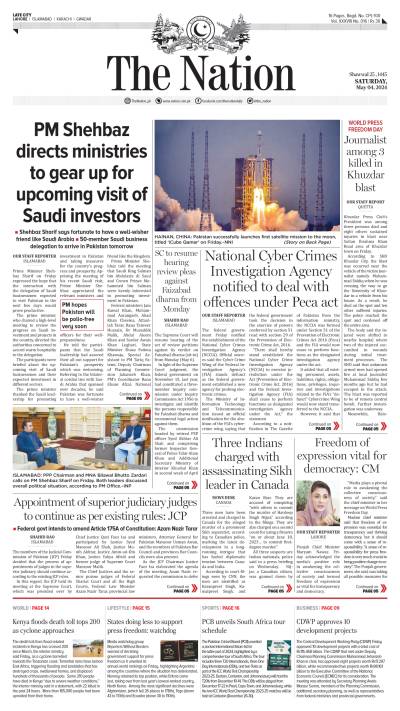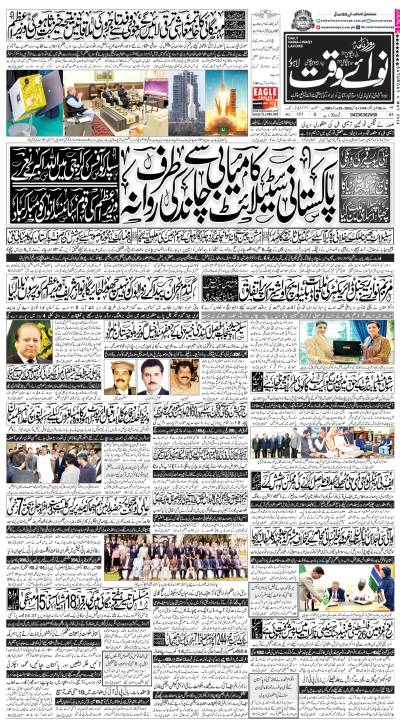Power tends to corrupt, and absolute power corrupts absolutely.-Lord Acton The prime minister's address to the nation in the early hours of March 16 announcing the reinstatement of Chief Justice Iftikhar Muhammad Chaudhry and other judges illegally removed from their offices by Pervez Musharraf crowned with success the glorious struggle of the lawyers, the civil society and some of the political parties, particularly PML-N, Jamaat-i-Islami and Tehrik-i-Insaaf. The prime minister also informed the nation about his government's intention to file a review petition in the Supreme Court against the disqualification of the Sharif brothers. The nation received the announcement with a sigh of relief as it lowered the political temperature in the country, which had been raised to dangerous levels, and held out the possibility of the nation and the government focusing their energies on the serious internal and external challenges besetting the country. There is no doubt that the lawyers' struggle for the restoration of the superior judiciary carried on for two years in the face of heavy odds will be written in golden letters in the history of Pakistan. The nation owes them a debt of gratitude for their valuable contributions for the establishment of the rule of law and the strengthening of the independence of the judiciary. The nation's thanks are also due to the civil society and the political parties which put their weight solidly behind the lawyers' movement. The decision by President Zardari and prime minister to bow before the will of the nation expressed in every nook and corner of the country is indeed a welcome step which cannot be praised enough. One only wishes that it should have been taken much earlier saving the nation the agony of uncertainty and the country the enormous political cost and economic damage of instability. It is clear in retrospect that the decision was the combined result of the growing internal pressure as a result of the lawyers' relentless struggle supported by the civil society and some of the political parties as well as the mediatory role played by some external powers. The army chief obviously played a constructive role behind the scene in bringing about the required conciliation and compromise leading to the prime minister's announcement. While the PML-N, Jamaat-i-Islami and Tehrik-i-Insaaf will politically benefit because of their principled stand on the judges' issue, the PPP, ANP and MQM will pay a heavy political price because of their policy of prevarication and ambiguity on the subject. To some extent, their stand has exposed the hollowness of their current leadership's commitment to the ideals of democracy and the rule of law in the country. In particular, the cavalier manner in which the PPP leadership recently appointed en masse their party workers, lacking the required credentials, as the judges of the High Courts, has revealed the disdain in which it holds the ideal of the independence of judiciary. Similarly, the harsh measures initially adopted by it to suppress the long march cannot be squared with its commitment to democratic principles. It is clear that President Zardari was led astray by some of his advisers who, having joined the PPP through the backdoor, had no stake in the democratic system in the country. Their shenanigans have badly tarnished the reputation of the PPP which otherwise has waged a long struggle and made invaluable sacrifices for the cause of democracy. Hopefully, the PPP leadership has drawn the right lessons from the bruising experience of resorting to strong arm tactics in dealing with the lawyers' movement. The first and the foremost lesson is that the threat or use of force is not the appropriate answer to a political problem. Political issues require political solutions. The civil society, the media and the people in Pakistan have awakened. The days when the governments of the day could ride roughshod over them are gone forever. They will have to be sensitive to the public opinion in the formulation of their internal and external policies. The second and the equally important lesson is that the victory in the election does not mean that the people should quietly accept whatever a government does till the next election. Constant vigilance is the essence of democracy. The people have every right, in fact the duty, to keep their governments under close scrutiny so as to keep them on the right track and to censure them if they go astray as happened in the case of the PPP government initially in dealing with the judges' issue. There is no denying the fact that the results of the general elections of February last year constituted an emphatic rejection of Musharraf's military dictatorship and his flawed policies, especially the suspension of the constitution and the virtual decimation of the superior judiciary on November 3, 2007 and the accompanying measures to gag the media. The split mandate given to the country's two main political parties, the PPP and the PML-N, required them to work together in a harmonious fashion to strengthen democratic institutions in accordance with the provisions of the Charter of Democracy to which both of them were committed. The reversal of the unconstitutional steps taken by Musharraf in November, 2007, particularly the restoration of the superior judiciary through an executive order, had to be the part and parcel of this process. The decision of the leaders of the two parties to form coalition governments at the centre and in the Punjab, and restore the judges of the Supreme and High courts as announced at Bhurban was, therefore, generally welcomed. However, subsequently the nation saw the PPP under Asif Ali Zardari repeatedly reneging on its written commitments to restore Chief Justice Iftikhar Muhammad Chaudhry and other judges of the superior judiciary through an executive order. The result was the parting of ways between the PPP and the PML-N. The growing gulf between them led to the showdown between them in the Punjab and the ouster of the Shahbaz Sharif government in the province. Hopefully, the latest announcement by the prime minister will enable the two parties to put all this behind them and embark once again upon a course of mutual cooperation in running the affairs of the state at the centre and in the Punjab. The legacy left behind by Pervez Musharraf was in the form of a decimated judiciary, the enormous damage inflicted upon the other institutions of state including the legislature and the executive because of the assumption of dictatorial powers by him and the resort to cronyism in violation of the principle of merit, the severe blows delivered by him to the sanctity of the constitution and the rule of law in the country, and his unsuccessful attempts to gag the media. The restoration of Chief Justice Iftikhar Muhammad Chaudhry and other judges of the superior judiciary is only the first step towards the demise of Musharraf's universally hated legacy. It is imperative that this first essential step is followed by others to put the country's political structure firmly on sound democratic principles. Therefore, the prime minister's invitation to the Sharif brothers to enter into a dialogue for the implementation of the Charter of Democracy to which both the PML-N and the PPP are committed is a step in the right direction. Above all, the leaders of these two parties as well as others should leave no stone unturned in getting rid of the undesirable elements of the 17th amendment as agreed to in the Charter of Democracy at the earliest. Hopefully, this will enable the country to resume its journey towards political stability and economic progress. But the demise of Musharraf's shameful legacy of wilful violation of the constitution requires that he should be brought under trial on the charge of high treason in accordance with Article 6 of the constitution and given the punishment that he deserves. Only when this is done, the nation will succeed in closing definitively the sad chapter of military take-overs and overthrow of democratically elected governments. The writer is a retired ambassador E-mail: javid.husain@gmail.com
Saturday, May 04, 2024
Demise of Musharraf's legacy
The writer is a retired ambassador and the president of the Lahore Council for World Affairs. Email: javid.husain@gmail.com
Dr Ahmar Sohail Basra assumes charge as Radio Pakistan Lahore station director
4:55 PM | May 04, 2024
Hearing against Ali Amin Gandapur adjourned until May 17
4:53 PM | May 04, 2024
May 9 perpetrators now giving statements about talks with military: Khawaja Asif
4:52 PM | May 04, 2024
Will provide free medicines to 200,000 patients at their doorstep: CM Maryam
4:51 PM | May 04, 2024
Saudi Arabia introduces new measures to reduce people performing illegal Hajj
4:20 PM | May 04, 2024
Tourist Tragedy
May 04, 2024
Ending Polio
May 04, 2024
Will Justice Prevail?
May 04, 2024
Fair Play
May 03, 2024
Parliamentary Stalemate
May 03, 2024
Current state of affairs
May 04, 2024
Cryptocurrency revolution
May 04, 2024
The accessibility revolution
May 03, 2024
Maternal well-being
May 03, 2024
Tackling poverty
May 02, 2024
ePaper - Nawaiwaqt
Advertisement
Nawaiwaqt Group | Copyright © 2024





